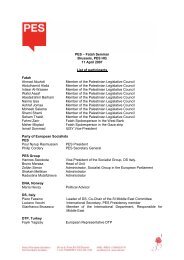Hedge funds and Private Equity - PES
Hedge funds and Private Equity - PES
Hedge funds and Private Equity - PES
You also want an ePaper? Increase the reach of your titles
YUMPU automatically turns print PDFs into web optimized ePapers that Google loves.
120<br />
TDC case, Denmark<br />
TDC was taken over by a group of five foreign private equity firm specialists – Apax Partners;<br />
Blackstone Group; Kohlberg Kravis Roberts; Permira; <strong>and</strong> Providence <strong>Equity</strong> – in the<br />
largest takeover in Europe to date. For about 10.5bn, they purchased 88.2% of TDC shares<br />
It was financed by slightly more than 80% debt. Capital management fees are not specified,<br />
but experience suggest they will be in the tens of million of euros. The 2005 Annual Report<br />
notes significant TDC credit rating downgradings by the St<strong>and</strong>ard <strong>and</strong> Poor <strong>and</strong> Moody<br />
Investor services as a result of the leverage buyout. The acquisition increases TDC’s net<br />
debt to total assets ration from 18% to about 90% at interest rates substantially higher than<br />
those for the previously established debt. TDC’s debt ratio is now 97% of capitalization. The<br />
new owners have been deliberately vague about why they have taken over TDC <strong>and</strong> what<br />
their plans are, stating only that they expect to own TDC for about five years. The evidence<br />
to date suggests that the TDC takeover has nothing to do with improving the efficiency of<br />
TDC. The new owners have no expertise in telecom <strong>and</strong> are relying virtually entirely on the<br />
previous management. The diversified stockholders were long term investors that left the<br />
management of the company to the managers. The immediate cash payout of almost half<br />
TDC’s assets suggests a pretty clear case of asset stripping, <strong>and</strong> the offering of shares in<br />
NTCI to 41 senior executives of TDC provides a major benefit to TDC management for<br />
continuing efforts leading to further cash payouts. This is short-term disinvestment, not longterm<br />
investment. Observers can be thankful that the only reason all these details about the<br />
takeover activities are known is because the new owners were unsuccessful in their attempt<br />
to de-list TDC from the transparency requirements for public stock trading.<br />
3.2 After an acquisition – conflict of interests<br />
The effects of <strong>Private</strong> <strong>Equity</strong> Fund buyouts <strong>and</strong> restructuring on infrastructure operators are<br />
magnified because of the unique characteristics of infrastructure operators noted above. The<br />
most significant impact is on the capability to efficiently finance long-term investment<br />
programmes. This is where the short-term priorities of <strong>Private</strong> <strong>Equity</strong> Funds <strong>and</strong> the long-term<br />
priorities of infrastructure operators are in direct conflict. After the acquisition, the new owners<br />
have a powerful incentive to pay themselves the major portion of the large internally generated<br />
cash flow that would have been used for reinvestment. In addition, the infrastructure operators<br />
acquire the large debt borrowed by the PEF to acquire the operator. This dramatically increases<br />
the firm’s debt-equity ratio <strong>and</strong> its annual interest obligations. It suffers a major decline in its<br />
credit ratings <strong>and</strong> the interest rates it must pay on its debt. Internally generated capital for reinvestment<br />
is dramatically reduced, as is the firm’s capability to borrow investment <strong>funds</strong>, even<br />
at higher interest costs. This means significant reductions in their investment programmess<br />
<strong>and</strong>/or increases in prices for consumers of their monopoly services.<br />
Other areas where this conflict between the short-term priorities of the <strong>Private</strong> <strong>Equity</strong> Funds <strong>and</strong><br />
the long term development focus of the infrastructure operators include:<br />
research <strong>and</strong> development, a long term priority where infrastructure operators traditionally<br />
have maintained activities, <strong>and</strong> <strong>Private</strong> <strong>Equity</strong> Funds typically have had no interest;<br />
quality of service where infrastructure operators traditionally have targeted a higher quality<br />
than <strong>Private</strong> <strong>Equity</strong> Funds are likely to find necessary to maximise short-term profits;




